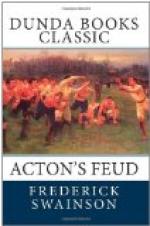to Acton, though quietly, “Play the game, sir!
Play the ball!” Acton flushed angrily, and I
did not like the savage way he faced round to Bourne,
who was particularly busy at that moment and did not
notice it. The game went on until within about
five minutes from time. Amber had been feeding
Aspinall assiduously for the last ten minutes, and
Acton had, despite his cleverness, more than he could
really hold in the flying International. He stalled
off the attack somehow, and Bourne always covered
his exertions, so that it seemed as if there would
be a draw after all. At last the ball was swung
across, and Aspinall was off on a final venture.
Acton stuck to him like a leech, but the winger tipped
the ball to his partner, and as Acton moved to intercept
the inside, the latter quickly and wisely poked the
ball back again to Aspinall. He was off again
in his own inimitable style, and I saw him smile as
he re-started his run. I rather fancy Acton saw
it too, and accepted the smile as a sneering challenge;
anyhow, he set his lips and I believe made up his mind
that in any case Aspinall should not get the winning
goal. How it exactly happened I cannot say, but
as Aspinall was steadying himself, when at top speed,
for an almost point-blank delivery, I saw Acton break
his own stride, shoot out his leg, and the next moment
the International was stumbling forward, whilst the
ball rolled harmlessly onward into our goal-keeper’s
hands. I could hardly believe my own eyes, but
it was a deliberate trip, if ever there was one!
Aspinall tried to recover himself, failed, and came
with a sickening crash against the goal-post.
I blew the whistle and rushed to Aspinall; his cheek
was bleeding villainously and he was deadly pale.
I helped him up, and he said with his usual smile—who
could mistake it for a sneer?—“Thanks,
old man. Yes, I do feel a bit seedy. That
back of yours is an animal, though.” He
tried hard to keep his senses; I saw him battling
against his faintness, but the pain and shock were
too much for him; he fell down again in a dead faint.
We improvised a hurdle and carried him up to the school.
Acton, pale to the lips, prepared to bear a hand,
but Bourne unceremoniously took him by the arm and
said with concentration, “No thanks, Acton.
We’ll excuse you—you beastly cad!”
I heard Bourne’s remark, though no one else saw
or heard. Acton’s hand closed involuntarily,
and he gave Bourne a vitriolic look, but did nothing
nor said anything. We took Aspinall up to Merishall’s—his
old house—where he was staying, and left
him there still unconscious.
What astonished me was that no one save Bourne had
noticed the trip, but when I came to think it over
the explanation was easy. Acton had, whether
from accident or of purpose, “covered”
his man and blocked the view from behind. I myself
had not really seen the trip, but it would have
been plainly visible for any one opposite on the touch-line,
and luckily there was no one opposite. The goal-keeper
might have seen it, but Roberts never attends to anything
but the ball—the reason he’s the fine
keeper that he is. Bourne had actually seen it,
being practically with Acton, and I knew by his pale
face and scornful eyes that he would dearly have liked
to kick Acton on the spot.




